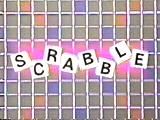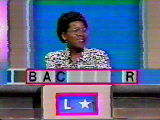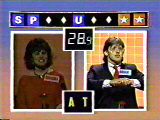Scrabble
From RulesWiki
| SCRABBLE | |
| The opening title for Scrabble. | |
|---|---|
| Airdates: | NBC June 1984 - March 1990, NBC January 1993 - June 1993 |
| Host: | Chuck Woolery |
| Announcers: | Jay Stewart, Charlie Tuna |
| Producer: | Reg Grundy Productions |
Contents |
Gameplay
Crossword Round
Each opening round was played between two players. A Scrabble board graphic was shown, and the players were told the letter they were building on, the length of the word, and a clue to the word. (For example, "Building on the letter A, eight letters in the word. The clue is, 'It always seems to get in the way.'" The answer to the word would be OBSTACLE.) One player (either the returning champion's challenger, or a coin-toss winner) would draw two tiles from a rack of between seven and 11, depending on the length of the word. The player would then attempt to place the letters that were drawn into the word, being allowed to guess after each placing. Three letters did not fit into the word; they were known as "Stoppers" and passed control to the other contestant if played. This continued until all but one letter had been placed in the word, at which point the player was forced to guess. If all three Stoppers were chosen, a speedword round was played in which the remaining letters were automatically filled in one at a time until someone buzzed in to guess. Also located in the words were blue and pink bonus squares; if the contestant could solve the word having just placed a letter in such a square, he also won a bonus of $500 (for blue) or $1000 (for pink), respectively.The first player to solve three words won $500 and advanced to the Scrabble Sprint, with control passing to the other player upon solving each word. If time was running short or both players were tied at two words apiece, the last few words of the round were played in the same speedword manner as described above.
Scrabble Sprint
During the Sprint round, each player was given a series of words to solve, increasing in length from five to nine letters. Two letters were shown at a time; the player would choose one of them to place into the word (no Stoppers were present in this portion of the game). When the player was ready to guess, he pushed the plunger in front of him to stop the clock. Giving an incorrect answer or otherwise mistakenly hitting the plunger resulted in a 10-second penalty. In addition, if all but one letter of the word was filled in, the player had five seconds to buzz in and guess the word, or else be subjected to a makeup word at the end.During the show's early years, the returning champion and the winner of the crossword round played a series of three words, with the challenger choosing from two sets and the champion playing what was left (later both players got the same three words with the champion going off to a soundproof room). The fastest player to finish their set won $1500, plus a $20,000 bonus for winning five games in a row and a second $20,000 bonus for winning ten games. This was later changed to a flat $20,000 and $40,000 for winning one's fifth and tenth games, respectively.
Eventually, two crossword rounds were played, one involving the previous day's champion and one new player, the other with two new players. The winner of each round played the Sprint with the same four words. The winner of that Sprint won $1000 and advanced to a Bonus Sprint round, where the player attempted to solve two words in under 10 seconds for a jackpot that started at $5000 and increased by $1000 each day it was not won. During the 1993 revival, the pink and blue squares in the crossword round did not award bonus money to the players, but rather added $500 and $1000 respectively to the Bonus Sprint jackpot, which started at $1000. In this format, champions remained on the show for a maximum of five days.
Notes
- At one point during the show's infancy, players were required to spell out the word they were guessing when attempting to solve it. This rule was quickly scuttled, however, when two players memorably had enormous trouble trying to spell "MOSQUITOS".
- In a similar vein as the original run of Card Sharks, home viewers began submitting their own clue words for use during the show's introduction. Those that had their words displayed got a Scrabble T-shirt as a prize.
- On the final episode of the original show, George Sealy ended the day as champion, winning a total of $9,500 in that game. When the show returned in 1993, George returned as the champion.




